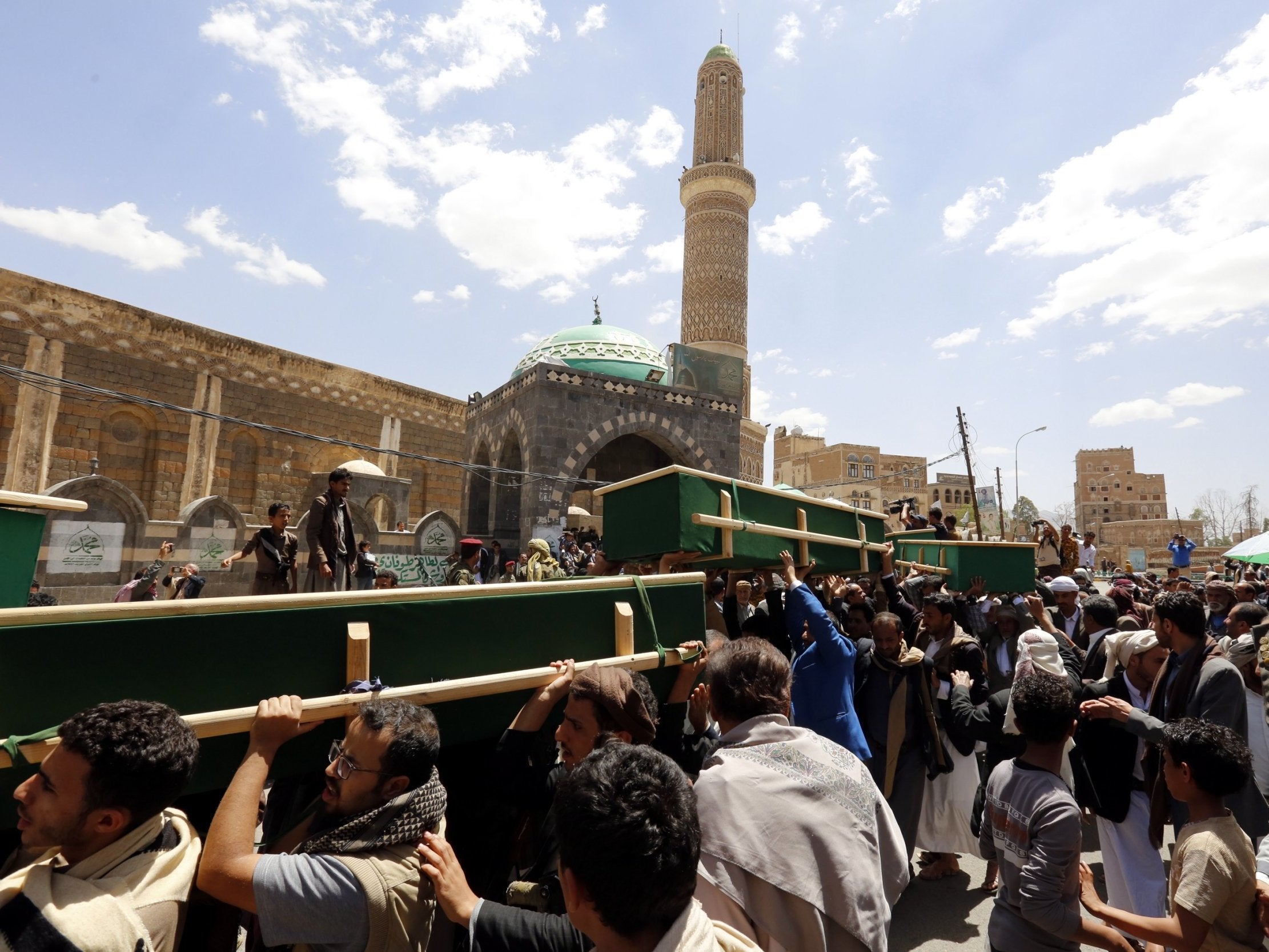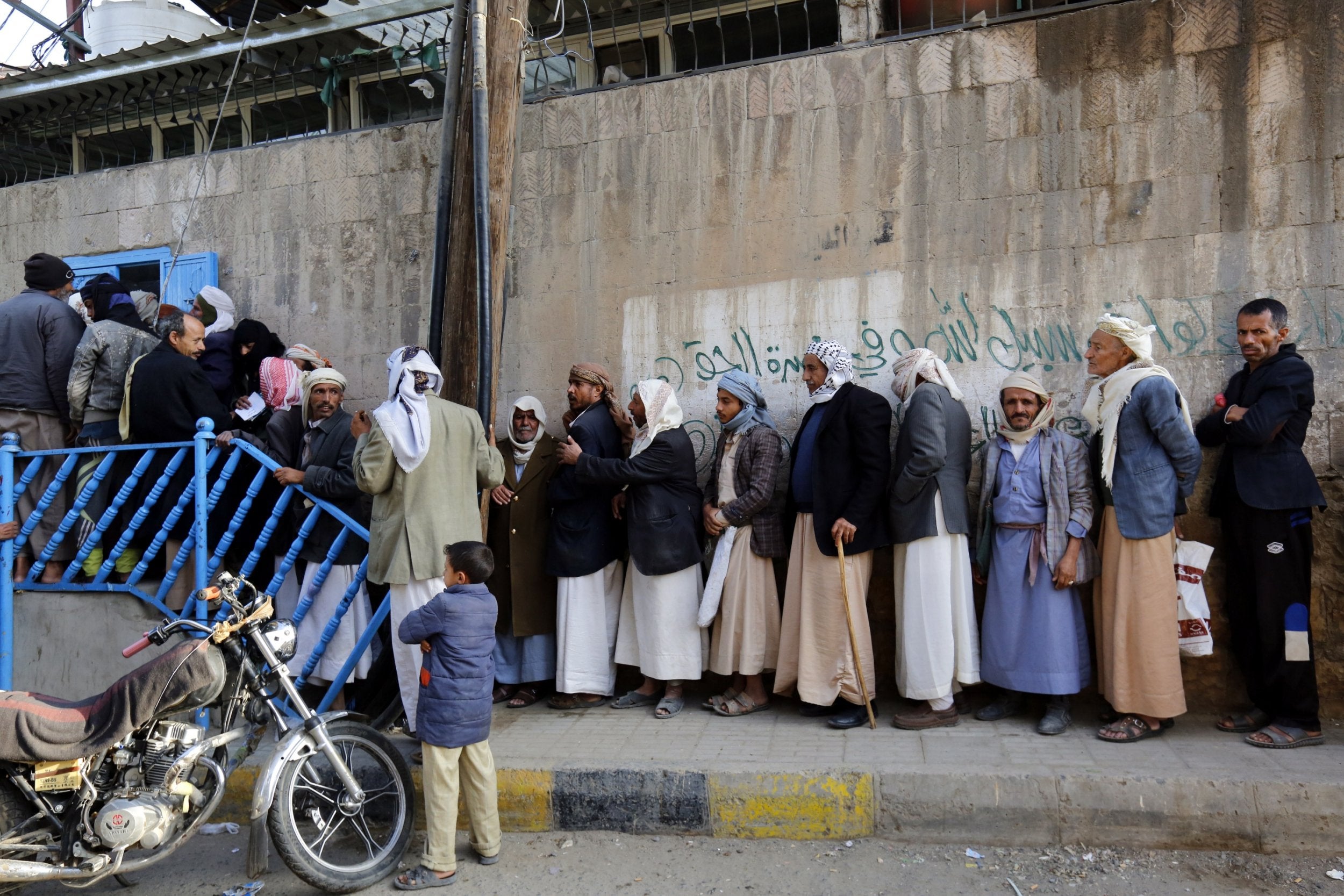Yemen war: UK-backed bombing campaign has killed more than 8,000 civilians, research says
Quarter of all civilians killed were women and children

A Saudi-led bombing campaign in Yemen that is supported by the UK government has killed more than 8,000 civilians, according to new research.
In the four years since the bombing campaign began, a total of 8,338 civilians have been killed by airstrikes, including 801 women and 1,283 children.
The figures were compiled by the Yemen Data Project, which analysed 19,511 air raids, and comes amid increased scrutiny over the UK’s role in the devastating conflict.
Riyadh intervened in Yemen’s civil war in 2015 to reinstate the internationally recognised government of Abd Rabbu Mansour Hadi, who was ousted by Iran-backed Houthi rebels.
The coalition, led by Saudi Arabia and the United Arab Emirates, has admitted to causing civilian casualties in the past, but attributes the deaths to “unintentional mistakes”, and says it is committed to upholding international law.
Together with the US, the UK has played a major role in supporting the coalition’s military campaign against the Houthis – who have also been accused of war crimes by the United Nations.
The UK has licensed £4.7bn worth of arms to Saudi Arabia since the bombing campaign began, including aircraft, helicopters, drones, bombs and missiles.
A recent report by the US-based University Network for Human Rights (UNHR) and Yemeni monitoring group Mwatana found that British and American bombs have killed and maimed nearly 1,000 civilians, including over 120 children in Yemen.
British foreign secretary Jeremy Hunt has consistently defended the sales, and argued in an op-ed on Tuesday that stopping sales to Saudi Arabia would lessen the UK’s influence.
“We could halt our military exports and sever the ties that British governments of all parties have carefully preserved for decades, as critics are urging. But in doing so we would also surrender our influence and make ourselves irrelevant to the course of events in Yemen,” Mr Hunt wrote in Politico.
“Our policy would be simply to leave the parties to fight it out, while denouncing them impotently from the sidelines,” he added.
However, critics have accused the UK of prioritising profit ahead of humanitarian concerns.
Mr Hunt was writing a day after five UK opposition parties called on the government to drop all arms sales to Saudi Arabia.
In a letter to Mr Hunt published in The Independent, Labour, the Green Party, SNP, the Liberal Democrats and Plaid Cymru wrote that: “It is disappointing that despite all the evidence to the contrary on a conflict that has lasted four years that the government has determined not to use all the means at its disposal to pressure an ally to abide by basic human rights laws.”
“This terrible war would not be possible without the political and military support of arms-dealing governments like the UK. As the war enters its fifth year it has only become more urgent that they do the right thing, and finally end the arms sales,” said Andrew Smith of Campaign Against Arms Trade.
“No matter how bad the situation has become, Jeremy Hunt and his colleagues have put arms company profits ahead of the rights and lives of Yemeni people.”
In addition to the casualties caused by bombing, the widespread fighting has caused what the United Nations describes as “the world’s worst humanitarian crisis.”
An estimated 24 million people – close to 80 per cent of the population – need assistance and protection in Yemen, and famine threatens hundreds of thousands of lives.
Western backers of the Saudi-led campaign have come under increasing pressure to end arms sales to the country in recent weeks amid a growing scandal over the killing of journalist Jamal Khashoggi at the Saudi consulate in Istanbul.
Saudi Arabia’s powerful Crown Prince Mohammed bin Salman – who has been the driving force behind his country’s intervention in Yemen – has faced international condemnation after it was revealed that members of his security detail were among the suspects in the killing.

But airstrikes are not the only danger for Yemen’s beleaguered population. Save the Children has reported an “alarming” spike in suspected cholera cases in the country.
It said 40,000 new cases were reported in just the last two weeks, an increase of 150 per cent compared to the same period last month. More than a third were children under the age of fifteen.
The country suffered its worst outbreak in history in 2017, when more than a million people were affected.
“A massive outbreak will be yet another killer for children left starved and weakened by four years of war. The tragedy is cholera can be easily prevented with access to clean water and basic hygiene. But that’s where we are right now. Yemen’s sewage system, which was already lacking before the conflict, is now almost non-existent,” said Tamer Kirolos, Save the Children’s Yemen country director.
“All parties to this conflict, and those supporting them, must take the only responsible action which is to urgently reach a peaceful resolution. Yemen’s children cannot be made to wait while war and deadly disease rage around them.”
Join our commenting forum
Join thought-provoking conversations, follow other Independent readers and see their replies
Comments